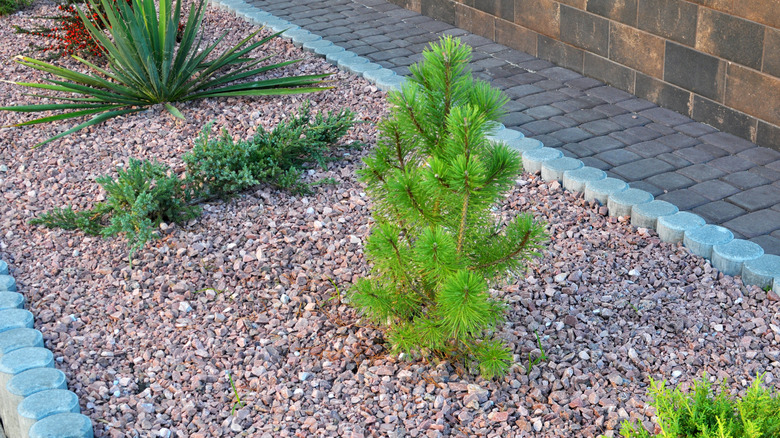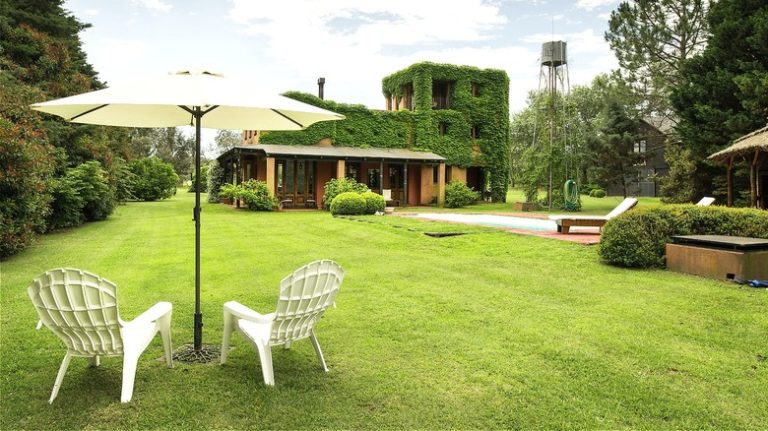Mulch is considered a very useful addition to the gardening landscape. The use of mulch also has aesthetic considerations. These days, you can find a variety of natural and dyed wood mulches, and also the increasingly widespread use of gravel and rocks as mulch. But it’s important to understand that even though rocks can fulfill some of the functions of mulch, it’s not technically mulch. There are some pros and cons to consider when deciding which material is best for your tastes and needs.
In terms of appearance, both traditional wood mulches and rocks/gravel can look very attractive. Rocks and gravel last longer because obviously, rock is more solid and permanent than wood. Also unlike wood mulch, gravel doesn’t need to be replaced and refreshed every season. But over time, gravel may lose some of its initial clean, bright look due to a number of factors. It can become dirty, it can become filled with weeds, and it can spread or spill out of its original area. Of course, similar things can happen to natural wood mulch too.
So, with that said, what are the practical and aesthetic benefits of wood mulch versus rocks or gravel? Is one better than the other? The answer may come down to a matter of taste, budget, and availability, as well as the effort required to apply both types.
The pros and cons of using rocks as mulch

Stones, rocks, and gravel come in a variety of colors, shapes, and sizes, and are easy to apply with a shovel or bucket and a rake. They provide drainage and prevent runoff, which can be helpful. They look very sophisticated and clean, with a striking contrast of light-colored stones with dark green plants. If you’re covering an area where people will be walking, rock holds up much longer than wood mulch.
There are some downsides to using rocks, however. They don’t hold moisture, so you’ll need to water more frequently. Rocks and gravel are fairly expensive, in terms of initial investment, but they’re long-lasting. Additionally, using gravel in beds generally requires a layer of landscaping fabric to deter weed growth, and some kind of edging to keep the gravel in place. You may want to “refresh” the top layer of stone to keep it looking clean and replace any stone lost due to movement or weather. Also, gravel doesn’t add any nutrients to soil, and can make your soil pH more alkaline over time.
Different types of rock have different qualities. Larger, oval “river rocks” look great around your shrubs, but they’re too big for flower beds. Pea gravel or smaller rocks work for some flower beds, but a tightly-planted full cottage-style garden doesn’t tend to do well with gravel. If your landscape plantings are few and far between, stones and gravel are suitable coverage options.
The pros and cons of wood mulches
Wood mulch is commonly used by many gardeners, landscapers, and homeowners. It’s relatively cheap, accessible, and easy to use. It helps deter weed growth, holds in moisture, and provides a neat look for flower beds and around shrubs and trees. Some people like the vivid colors of dyed mulches and the uniform “finished” look they provide. Dyed mulches usually come in brown, red, or black, and the wood base is usually pine chips or nuggets, and sometimes cedar. Some dyed mulches are treated with additional herbicide for weed control.
You can also get cedar mulch that is undyed — cedar contains a natural insect repellent. Another option for natural undyed organic mulch is pine bark mulch, available shredded, or in large and mini-nuggets. Cocoa shells were once a popular decorative natural mulch, but they fell out of favor when it was discovered they could be toxic if large amounts were ingested by dogs.
In addition to wood chip mulch, there are other natural organic materials that can be used as mulch: leaves, pine straw, pine needles, grass clippings, and straw. All of these materials break down and add nutrients to the soil over time. Some of these materials are also often part of your normal yard maintenance waste, so they cost virtually nothing. For gardeners on a budget, natural mulches are a much more affordable option than stone.
